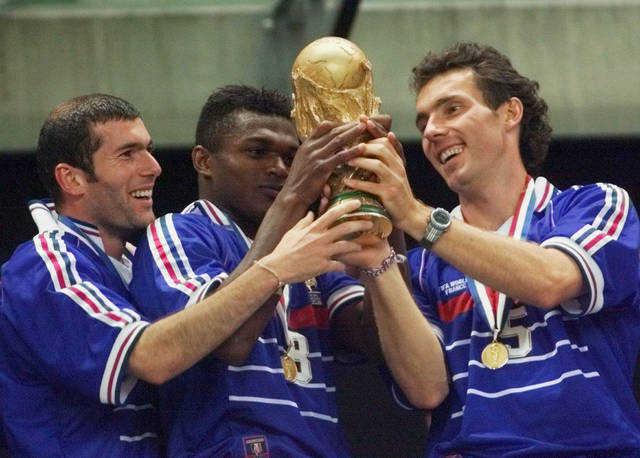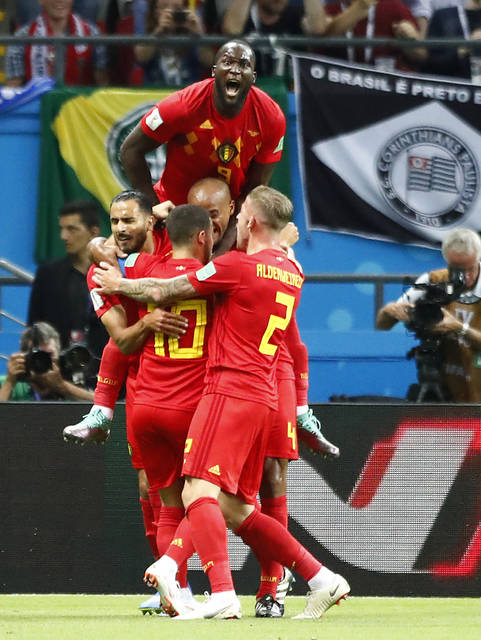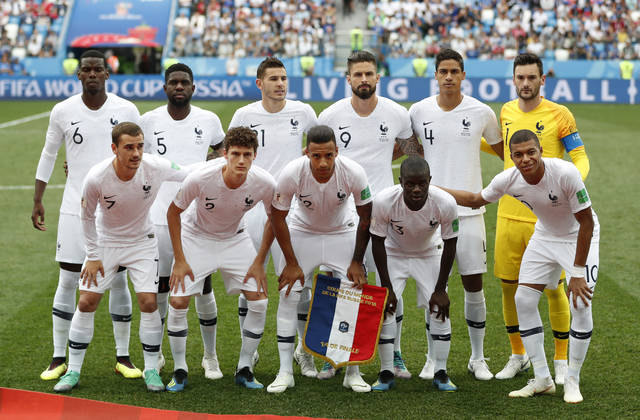


Eds: With AP Photos.
PARIS (AP) — When France’s xenophobic fringes disparage the country’s diverse World Cup team as more African than European, fans say, “So what?” And then respond with a resounding “Allez les Bleus!”
At a time when populist politicians are trying to choke off or reroute migration flows, what matters to fans of the teams that made the semifinals — England, France, Belgium and Croatia — wasn’t the players’ ancestry but that they excelled on the field.
Yes, the French team has roots stretching across borders, seas and hemispheres, tracing histories of colonization and the paths of migration that shaped today’s world. But nearly all of its players were born and raised in France.
And Tuesday they face a semifinal match against Belgium, whose country took inspiration from France’s multi-ethnic 1998 winning team and has used soccer as a tool for integration and a ladder out of poverty.
Belgium striker Romelu Lukaku embodies that philosophy.
“I’ll start a sentence in French and finish it in Dutch, and I’ll throw in some Spanish or Portuguese or Lingala, depending on what neighborhood we’re in,” he wrote in The Player’s Tribune. “I’m Belgian. We’re all Belgian. That’s what makes this country cool, right?”
When England faces Croatia in the other semifinal match on Wednesday, it will field a team that coach Gareth Southgate says “represents modern England.” With 11 of 23 players of African or Caribbean descent, it’s the country’s most diverse national team yet. Several Croatian players were also foreign-born.
Europe has been enjoying the benefits of migration for centuries, and the diverse rosters at this year’s World Cup are just the latest example.
“Football allows us to put immigration on stage, a question that is agitating European countries right now,” said Yvan Gastaut, a University of Nice historian who curated an exhibit on soccer and migration. “For people who see immigration as a danger, this World Cup story won’t resolve that. But it allows us to take stock of the reality of the world, of mobility, movements, multiple identities.”
Soon, he predicts, European countries will reach a point where diverse team rosters don’t matter, and “we can focus on something else other than what are our origins.”
That seems a distant dream in some quarters. France has always been a melting pot, and today you can have a croissant for breakfast, West African maafe stew for lunch and couscous for dinner. But poverty, prison and unemployment disproportionately touch those with Arab or African last names.
That’s why it’s worth noting the Algerian-Cameroonian roots of France’s 19-year-old breakout star Kylian Mbappe, argues Laurent Dubois, a Belgian-American historian at Duke University.
“It at least offers a sense that migration is helping. Look, we’re stronger because we have all these people. … Players with all these different stories united in this kind of flow. There’s nothing wrong with seeing that as a symbol and celebrating it,” he said. If national teams show unity in diversity, “then maybe society can do that in other realms, too.”
It’s a message that reaches all the way to Africa, where many are turning far-right racist comments about non-white players in Europe on their heads, and are waving the European teams’ African connections as a banner of continental pride after their own teams were eliminated.
“I think the presence of players of African origin will push some French people who are against immigration to reconsider their position — especially if this team manages to win the cup,” said Senegalese merchant and France fan Souleymane Diallo.
In Lagos, Nigeria, soccer enthusiast Ola Adelere summed up sentiments of many African fans: “In a way, France is Africa’s remaining representative at the World Cup.”
Europe owes its sporting power today to a long-running outreach into poor suburbs or neighborhoods, giving kids of all backgrounds access to coaches and fields and facilities — and teams more talent to choose from. A 2013 study seemed to vindicate that strategy: In examining 10 years of Europe’s Champions League matches, it found that more diverse teams outperformed less diverse ones.
The victory of France’s 1998 team — celebrated for its “black-blanc-beur,” or black-white-Arab makeup — was a turning point, becoming a potent anti-racist symbol and serving as an example to other European countries.
But it didn’t magically change France. Some players complain that it created an unfair pressure on minorities to win the World Cup to be accepted as a success.
Soccer glory can only briefly apply a thin veneer over deep divisions within England, profoundly split by Brexit, or Belgium, long split between its Flemish and Walloon sides.
And diversity is always easier to digest when the team is winning.
“When things were going well, I was reading newspaper articles and they were calling me Romelu Lukaku, the Belgian striker. When things weren’t going well, they were calling me Romelu Lukaku, the Belgian striker of Congolese descent,” Lukaku wrote. “If you don’t like the way I play, that’s fine. But I was born here. I grew up in Antwerp, and Liege and Brussels.”
England may be the new example to follow, as the team’s mixed makeup has been met by a collective shrug at home.
“Our nation has changed,” British historian and broadcaster David Olusoga wrote in the Guardian. While soccer fandom has been used in the past as “a rallying point for a xenophobic and sometimes racist strain of English nationalism,” that has “increasingly seemed out of step with contemporary reality.”
For fans like Dubois, what matters during the World Cup is the game, and its ability to allow players and countries to forget sins and scars of colonialism, war or persecution, and dream together of a triumphant future.
“A successful national team that may win the World Cup is on some level untouchable,” he said. “The joy they produce — there is no other group of people who can do that in the world.”
___
Associated Press writers Babacar Dione in Dakar, Senegal, Sam Olukoya in Lagos, Nigeria, and AP Sports Writer John Leicester in St. Petersburg, Russia, contributed to this report.
___
More AP World Cup coverage: https://apnews.com/tag/WorldCup




